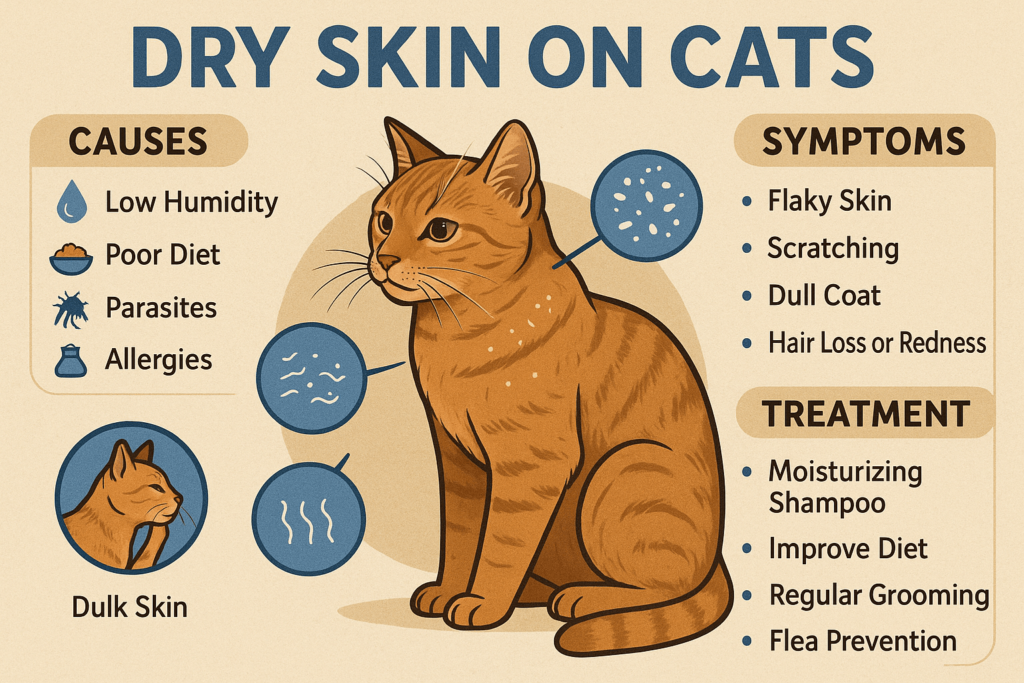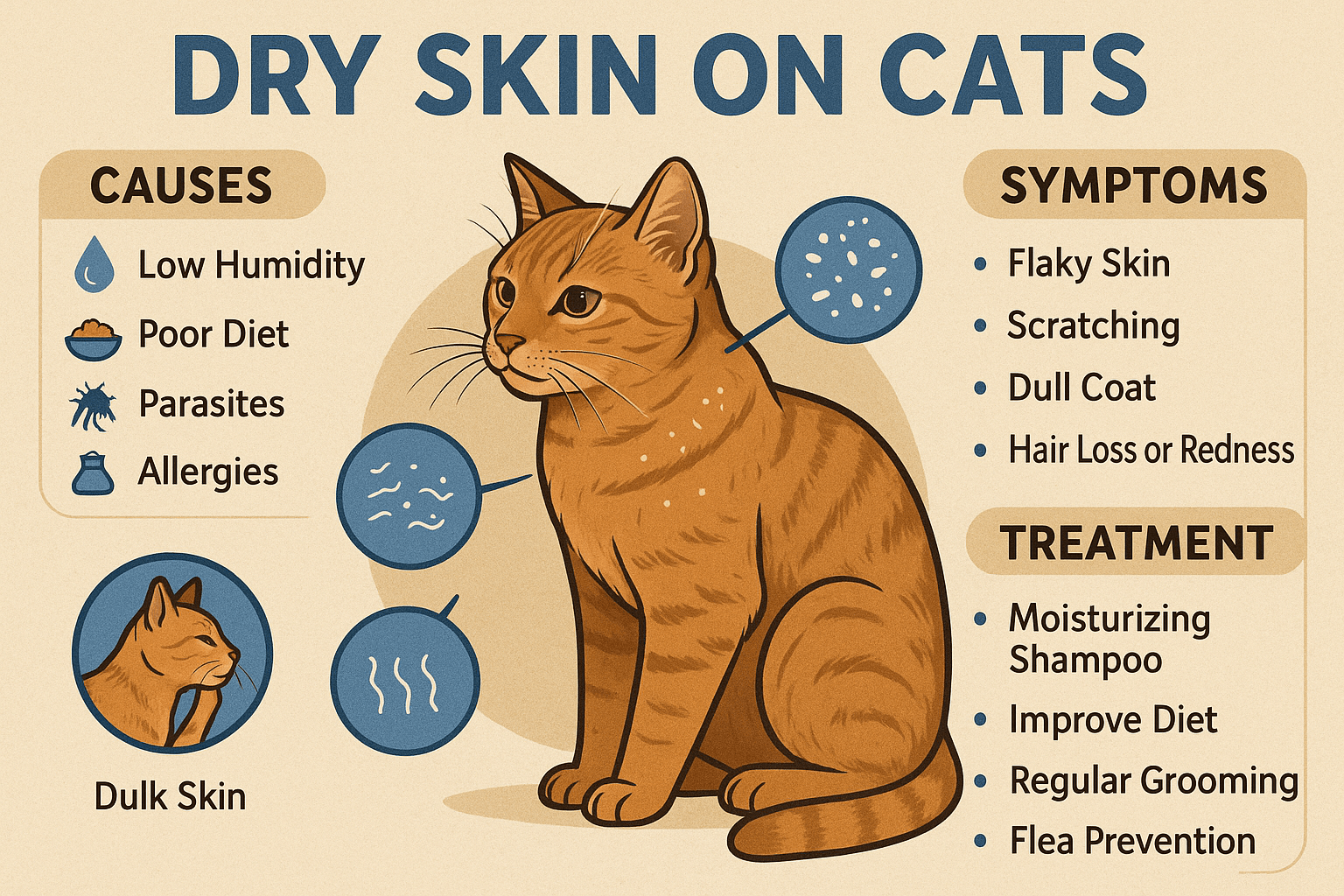Dry Skin on Cats: Causes, Symptoms, and Solutions
Dry skin on cats is more than just an aesthetic issue—it can indicate underlying health concerns or environmental factors affecting your feline friend. While cats are known for their sleek, glossy coats, dry, flaky skin can sometimes disrupt their natural beauty and comfort. If you’ve noticed dandruff, excessive scratching, or a dull coat, it’s important to understand what might be causing these symptoms and how to address them effectively. In this blog post, we’ll explore the common causes of dry skin in cats, practical solutions to alleviate discomfort, and tips to keep your cat’s skin and coat healthy year-round.
Expert Insight on Dry Skin in Cats
“Dry skin can be uncomfortable, itchy, and irritating, so it’s best to figure out the root cause to get this problem solved. In most cases, dry skin is not the result of a serious condition but there are a few potential underlying causes.”
Common Causes of Dry Skin on Cats
Dry skin in cats can stem from a variety of factors, ranging from dietary deficiencies to environmental conditions. Identifying the root cause is the first step toward resolving the issue.
Poor Nutrition:
A diet lacking essential fatty acids, vitamins, or proteins can lead to dry, irritated skin and a dull coat.Dehydration:
Cats are notorious for not drinking enough water, which can contribute to dry skin and overall dehydration.Environmental Factors:
Low humidity levels, especially during winter months, can strip moisture from your cat’s skin.Allergies:
Food allergies or environmental allergens like pollen, dust mites, or cleaning products may irritate your cat’s skin.Underlying Health Conditions:
Issues such as hypothyroidism, diabetes, or parasitic infections can also cause dry skin in cats.
Understanding these potential triggers allows you to take targeted steps to improve your cat’s skin health and overall well-being.

Signs Your Cat May Have Dry Skin
Recognizing the symptoms of dry skin early can help you address the problem before it worsens. Keep an eye out for these telltale signs that your cat might need extra care.
Flaky Dandruff:
White flakes visible on your cat’s fur or bedding are a clear indicator of dry skin.Excessive Scratching or Licking:
Persistent grooming behaviors may signal irritation caused by dryness or itchiness.Hair Loss:
Patches of missing fur often accompany dry skin due to over-grooming or inflammation.Red or Irritated Skin:
Check for areas of redness or scabs, which could indicate an allergic reaction or infection.Dull or Brittle Coat:
A lackluster coat that feels rough to the touch may reflect poor skin health beneath the surface.
By staying vigilant about these signs, you can intervene promptly and restore your cat’s skin and coat to their optimal condition.
Check this guide 👉Understanding Cat Skin Cancer: Best 7 Expert Tips!
Check this guide 👉Understanding Skin Tags on Cats: Best 7 Expert Health Tips!
Check this guide 👉Cat Alopecia Treatment: Best 7 Expert Tips!
Causes of Dry Skin on Cats | Solutions to Improve Skin Health |
|---|---|
Poor nutrition | Feed a balanced diet rich in omega-3s |
Low humidity | Use a humidifier in your home |
Allergies | Identify and eliminate allergens |
Dehydration | Encourage water intake with wet food |
Underlying health issues | Consult a vet for diagnosis and treatment |
How to Treat Dry Skin on Cats Naturally
If your cat is experiencing dry skin, there are several natural remedies and lifestyle adjustments you can try at home to soothe their discomfort.
Switch to a High-Quality Diet:
Opt for cat food formulated with omega-3 and omega-6 fatty acids, which promote healthy skin and a shiny coat.Add Moisture-Rich Foods:
Incorporate wet food into your cat’s meals to increase hydration and support skin elasticity.Use a Humidifier:
Adding moisture to the air prevents your cat’s skin from drying out, particularly during colder months.Groom Regularly:
Brush your cat’s fur gently to distribute natural oils and remove loose hair and dandruff.Avoid Harsh Shampoos:
Use only cat-safe shampoos free of harsh chemicals that can further irritate sensitive skin.
These natural approaches can make a significant difference in alleviating dry skin and keeping your cat comfortable.
When to See a Veterinarian for Dry Skin
While many cases of dry skin can be managed at home, some situations require professional veterinary attention. Knowing when to seek help ensures your cat receives the care they need.
Persistent Symptoms:
If dry skin doesn’t improve after making dietary or environmental changes, consult your vet for further evaluation.Severe Hair Loss:
Excessive shedding or bald patches may indicate an underlying medical condition requiring treatment.Visible Infections:
Red, inflamed, or oozing skin could point to a bacterial or fungal infection that needs medication.Behavioral Changes:
Increased lethargy or loss of appetite alongside dry skin may signal a systemic health issue.Parasite Infestations:
Fleas, ticks, or mites can cause intense itching and dry skin—your vet can recommend appropriate treatments.
Seeking timely veterinary care ensures your cat’s dry skin is properly diagnosed and treated.
Preventative Measures for Dry Skin
Preventing dry skin on cats involves proactive steps to maintain their overall health and minimize exposure to irritants. These measures can reduce the likelihood of future issues.
Provide Fresh Water Daily:
Ensure your cat has access to clean, fresh water at all times to combat dehydration.Maintain a Balanced Diet:
Choose high-quality food specifically formulated to support skin and coat health.Minimize Stressful Environments:
Create a calm and predictable environment to reduce stress-related skin problems.Regular Vet Check-Ups:
Routine veterinary visits help catch potential issues early before they escalate.Avoid Over-Bathing:
Limit baths to special occasions, as excessive washing can strip natural oils from your cat’s skin.
Taking preventative action can significantly lower the risk of dry skin and keep your cat feeling great.
Best Foods for Cat Skin Health
Nutrition plays a vital role in maintaining healthy skin and a lustrous coat. Incorporating specific foods into your cat’s diet can work wonders for their skin.
Omega-3 Fatty Acids:
Found in fish oil, these fats reduce inflammation and nourish the skin.Protein-Rich Ingredients:
High-quality animal proteins provide the building blocks for healthy skin cells.Antioxidant-Rich Foods:
Ingredients like blueberries and spinach support overall skin health and immunity.Moisture-Dense Wet Food:
Canned food helps hydrate your cat internally, combating dryness.Limited Fillers and Additives:
Avoid foods with artificial preservatives or excessive grains, which can irritate sensitive skin.
Feeding your cat nutrient-dense foods sets the foundation for glowing skin and a vibrant coat.
Environmental Adjustments for Cat Skin Care
Your home environment can have a profound impact on your cat’s skin health. Making simple adjustments can create a more skin-friendly space for your pet.
Control Humidity Levels:
Use a humidifier to maintain optimal indoor humidity, especially during dry seasons.Clean Bedding Regularly:
Wash your cat’s bedding weekly to remove allergens and dander buildup.Choose Gentle Cleaning Products:
Opt for pet-safe cleaners that won’t irritate your cat’s respiratory system or skin.Limit Exposure to Extreme Temperatures:
Protect your cat from harsh weather conditions that can exacerbate dryness.Provide Shade and Rest Areas:
Ensure your cat has cozy spots away from direct sunlight or drafts that can dry out their skin.
By optimizing your home environment, you can create a sanctuary that promotes healthy skin and a happy cat.
Frequently Asked Questions About Dry Skin on Cats
Can I use human moisturizers on my cat?
No, human products can irritate your cat’s sensitive skin. Stick to vet-recommended solutions instead.
How often should I groom my cat?
Grooming frequency depends on your cat’s coat type, but weekly brushing is generally sufficient for most cats.
What role does hydration play in skin health?
Proper hydration supports skin elasticity and helps prevent dryness and flakiness.
Are certain breeds more prone to dry skin?
Yes, hairless breeds like the Sphynx and long-haired breeds like the Persian may experience dry skin more frequently.
Can stress cause dry skin in cats?
Yes, stress can weaken your cat’s immune system, leading to skin issues. Addressing the source of stress can help.
Promoting Healthy Skin and a Happy Cat
Dry skin on cats is a manageable issue with the right knowledge and care. By understanding the causes, recognizing the symptoms, and implementing practical solutions, you can ensure your feline companion enjoys a soft, shiny coat and comfortable skin. Whether through dietary improvements, environmental adjustments, or veterinary intervention, prioritizing your cat’s skin health strengthens your bond and enhances their quality of life. Remember, a happy cat starts with attentive care—and addressing dry skin is a meaningful step toward achieving that goal.
Understanding Bone Supplement for Cats: Best 7 Expert Tips! – Safe, vet-approved guidance for strong feline bones & balanced nutrition.
Bone Supplement for Dogs: Best 7 Expert Tips! – Expert guide to calcium, collagen & bone health for every life stage.
Understanding Can Cats Get Sunburn: Best 7 Expert Tips! – Protect your feline from UV damage with vet-backed prevention strategies.
How to Train a Seizure Alert Dog: Best 7 Expert Tips! – Learn expert-backed steps to nurture natural instincts into reliable, life-saving seizure alerts.





